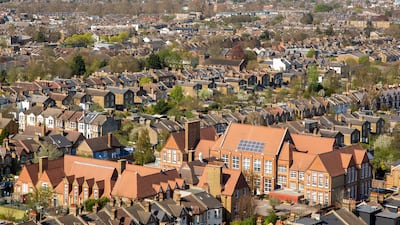The cost of making Britain’s homes greener will reach about £42.5 billion over the next 10 years, a UK think tank said on Thursday, with low-income households set to shoulder the majority of the financial burden.
Poorer households are more likely to live in energy-inefficient homes, leaving them with larger sums to pay than wealthier Britons to decarbonise their homes, the Resolution Foundation said in its report.
The study, carried out in partnership with the London School of Economics and the Nuffield Foundation, called for net zero to be placed at the centre of the UK’s economic strategy to ensure the country can hit its green targets with the costs and benefits of the transition shared equally across society.
“The past couple of years, we've seen numerous targets set for emissions, we've seen net zero targets, carbon budgets ... we’ve seen targets for offshore wind, total hydrogen targets for heat pumps, but at the moment, we've got no policies to really achieve any of these,” Jonny Marshall, senior economist at the Resolution Foundation, told a seminar in London.
“The 2020s are absolutely vital in increasing the pace of decarbonisation hitting these goals and getting back on track to where it needs to be to reach net zero.”
Mr Marshall said the next stage of decarbonisation would be very different than the past with a much greater impact on households and day-to-day life.
With half of the cost of decarbonising homes set to be met by property owners, Mr Marshall said this must happen in a way that did not penalise those who did not have the means to invest in their homes.
With lower-income households more likely to live in energy-inefficient homes, they face higher energy bills in the current gas supply crisis than those in more-efficiently rated homes.
“If these higher increases are felt by people with low financial means, that is obviously going to be problematic,” Mr Marshall said.
Lower-income households will also struggle to access cheaper motoring costs that come with having an electric car as many either do not have a car or they cannot charge green vehicles as they do not have access to off-road parking.
“Without policy intervention, these benefits are going to be concentrated among higher income and richer families,” Mr Marshall said.
While Britain has cut territorial carbon emissions by close to 50 per cent since 1990, it is “far from half way” towards ending its contribution to climate change.
“Eliminating the remaining half – by cutting carbon from our homes and transport – will be more disruptive than the first – when we mainly cut carbon emissions from electricity generation,” the Resolution Foundation said.
As a result the next decade is crucial and must combine a "double acceleration" of the UK’s transition to a low carbon economy in which the pace and depth of emission reduction increases at the same time as ensuring new policies do not widen inequalities by loading costs on to lower-income households or allowing the benefits to flow to the better off.
“This approach needs to be set out soon. Net zero will be a key driver of economic change in the 2020s and beyond, leading to changing patterns of consumption and large-scale investment with significant impacts on government, firms, workers and consumers," the foundation said.
“It also fundamentally changes the context for the UK’s economic strategy, which is in desperate need of renewal as we seek to drive a strong, sustainable and inclusive recovery from Covid-19 and adjust to changes in international relationships and domestic policy post-Brexit.”
To hit the UK’s target of becoming net zero by 2025, more societal and behavioural changes are needed than seen in recent decades.
“Emissions from surface transport are virtually unchanged from 2010, and those from residential buildings have actually increased," the foundation said.
“From now to 2035, transport emissions will need to fall by more than 72 per cent, while emissions from our homes will need to fall by almost half. This will involve change – good and bad – from households, both as consumers and as workers."
The total cost of reaching net zero by 2050 could run as high as £1.4 trillion, according to the Office for Budget Responsibility’s Fiscal Risks report.
While the cost of transitioning to a greener economy falls each year and starts to pay off in the 2040s, the green transition will still be one of the largest outlays on the government’s books.
The path to net zero requires annual net investment of £27bn and £15.9bn per year in the 2020s and 2030s respectively, before an annual net payback of £11.2bn in the 2040s.
The foundation called for the debate on climate change to focus on how the government can achieve net zero goals efficiently.
"Wee need to take net zero out of the silo within which climate policy has generally been placed and put it at the centre of the UK economic model," Mr Marshall said.


